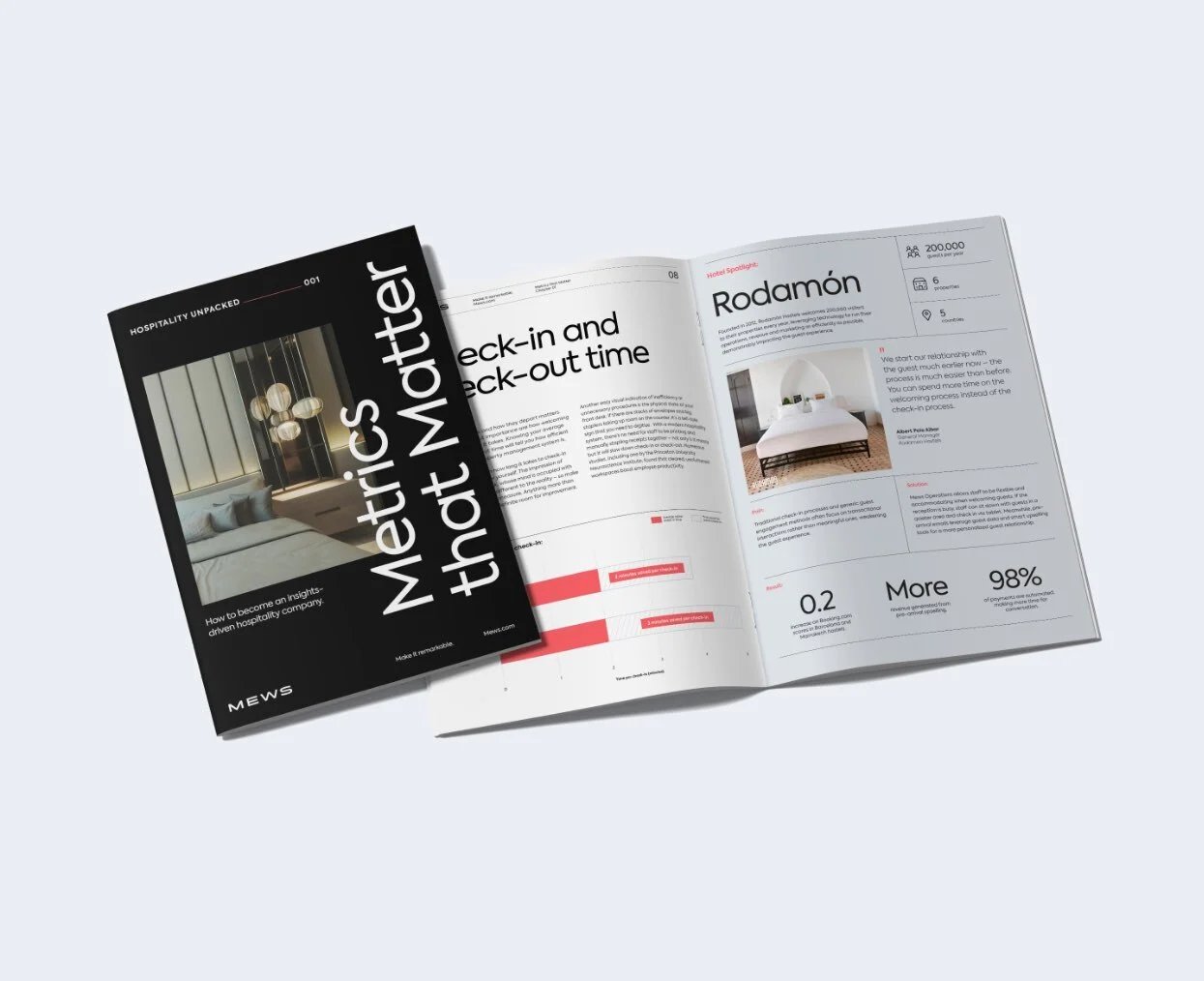Hospitality marketing is more than just identifying your target audience. It's about creating genuine connections with potential guests seeking unique experiences. With the right strategies, you can build trust, attract the ideal customers, and foster long-term loyalty that keeps them coming back.
If you're in hospitality management and want to sharpen your marketing plan, this guide will walk you through everything you need to know: why hospitality marketing matters, the essential 7 Ps framework, current trends, and proven strategies to keep your brand ahead of the curve.
Table of contents
What is hospitality marketing?
Hospitality marketing is all about using a variety of strategies to attract and engage guests, driving business to your hotel or hospitality service. From digital marketing and email marketing to social media and influencer partnerships, the goal is to connect with your target audience and build meaningful relationships.
At its core, hospitality marketing focuses on creating memorable experiences that inspire loyalty and keep guests coming back. It's not just about promoting rooms or services – it's about building a brand that guests trust and want to engage with again and again, no matter the market conditions.
Why is hospitality marketing important?
Hospitality marketing is essential because it's how you connect with potential guests, build brand awareness, and take care of reputation management in a highly competitive industry. With so many options available, standing out is key, especially as demand can shift dramatically with the seasons.
Successful marketing campaigns help attract guests, but the real win comes from delivering exceptional experiences that turn first-timers into loyal customers. To grow your brand, you need strategies that engage your target audience at every step of the marketing funnel, from the moment they discover you, through consideration and booking, all the way to becoming repeat visitors.

What are the 7 Ps of hospitality marketing?
The 7 Ps are a handy framework to help you build and evaluate your hospitality marketing strategies. Originally introduced by Jerome McCarthy, they expand on the classic 4 Ps of marketing by adding three extra elements focused on service.
Here's a quick breakdown:
1. Product
This is the heart of your brand – your rooms, services, facilities, and the overall experience you offer. It's also about how you want guests to see you and what makes you unique.
2. Price
Price isn't just about the number on the tag. It's about the right pricing strategy that considers your potential customers, seasonality, room types, and how your value stacks up against competitors. Smart revenue management here means balancing what you charge with what guests are willing to pay.
3. Place
Think beyond your hotel's location. Place means the channels you use to sell your rooms, like online platforms, travel agencies, direct bookings, or offline options. It's about making it easy for guests to find and book with you.
4. Promotion
This covers how you get the word out, from social media and influencer marketing to PR, advertising, and content marketing. The goal is consistent, engaging communication that keeps your brand top of mind.
5. People
Your team and your guests are the living heart of your brand. Highlighting your staff's warmth and professionalism, and encouraging guests to share positive stories, builds trust and personality into your marketing.
6. Process
Every step of the guest journey should feel seamless. From booking and check-in to room service and check-out, well-designed processes ensure your brand delivers a smooth, reliable experience.
7. Physical evidence
This includes everything guests see and feel, such as your décor, room layout, the quality of linens, and even staff interactions. These tangible details shape how people perceive your brand and can turn a stay into a memorable experience.
How can the 7 Ps drive your marketing campaigns?
The 7 Ps of marketing are more than just theory. They're a practical toolkit to help you deliver the right message, at the right price, through the right channels, to the right target audience. Whether you're working with a marketing agency or flying solo, having a clear strategy with well-defined goals will make your campaigns more effective and help you grow your brand.
The right message
Everything starts with your core message. For a hotel, that usually means selling rooms and creating memorable stays. From there, you can boost your offering by showcasing your unique selling points through social media, SEO, influencer partnerships, and paid ads – all designed to highlight what makes your hotel special.
The right price
Setting the right price means knowing your guests, understanding market trends, and benchmarking against your competitors. It's about being affordable and offering the best value at the right time.
The right place
Where your rooms are promoted matters. Make sure you're visible on the right platforms, like your own website, OTAs, social media, and more. Don't forget to optimize your website for direct bookings, and build partnerships and loyalty programs with local businesses to add extra value for guests.
The right messaging
Tailor your communication based on where guests are in their journey. A potential customer just discovering your brand needs different information than a loyal guest ready to book. Target your messaging to fit each stage and audience demographic for maximum impact.
The people
People are the heart of the hospitality sector. Investing in technology that streamlines admin tasks frees up your team to focus on what really matters: delivering exceptional guest experiences. Happy, empowered staff = happy guests.
The guest experience
This covers the entire guest journey, from inquiry and booking to check-in, stay, and check-out. Smooth, efficient processes at every step make it easy for guests to choose you and come back again.
Service
Your service and physical environment, from the décor and cleanliness to amenities and dining options, all leave an impression and contribute to the customer experience. Showcasing these elements on social media and other channels helps potential guests get a real sense of what to expect.

9 key hospitality marketing strategies your hotel needs
To make your hospitality marketing really work, you need a solid plan that covers all the channels where your guests spend their time, whether you have an internal marketing team or an external agency.
Here are nine key hospitality marketing strategies to help you get noticed and keep guests coming back:
1. Search engine optimization (SEO)
SEO helps your hotel show up when people are searching online. Using the right keywords gets you in front of the right audience. And with AI-powered search results becoming more common, don't forget to optimize your content for generative search tools too.
2. Content marketing
Your content is your voice across every platform, including your website, social media, blog, brochures, even in-hotel signage. Keeping your message consistent and on-brand everywhere helps guests connect with you and remember what makes you special.
3. Influencer marketing
Influencers bring a trusted face to your hotel. When you work with people who speak to your target guests you get authentic recommendations that can drive awareness and bookings.
4. Email marketing
Emails keep the conversation going with both potential and past guests. Whether it's a special offer, a friendly reminder, or an exclusive invite, email helps you nurture relationships and turn one-time visitors into loyal customers.
5. User-generated content
There's nothing more user-friendly or convincing than real guests sharing their experiences. Encourage user-generated content like reviews, photos, and stories to create trust, spark excitement, and make potential guests want to book their stay.
6. Highlight your people
People make hospitality what it is. Show the faces behind your brand who make each stay memorable, like hotel management, the front desk, housekeeping, and more. Sharing real moments from your staff builds a connection with potential guests and makes your hotel feel welcoming and genuine.
7. Partner up
Creating partnerships with local businesses like restaurants, tour guides, travel agencies, or tourism boards can open new doors. These partnerships help spread the word, build community, improve rankings on search engines, and give your potential guests even more reasons to choose you.
8. Personalization and AI-driven marketing
Smart marketing is personal. Use AI tools to deliver tailored recommendations, personalized emails, and dynamic web content that make guests feel seen and valued.
9. Events
Hosting events turns your hotel into a local hub. Whether it's a cultural night, a networking event, or a seasonal party, events bring the community to you and keep your brand buzzing.
How to improve your hospitality marketing strategy
Successful hospitality marketing isn't just about ticking boxes – it's about understanding the unique challenges of the industry and turning them into opportunities.
1. Embrace intangibility with storytelling
Your hotel's product isn't something guests can touch or test before booking. That means your marketing has to do the heavy lifting. Use compelling storytelling, vibrant visuals, and genuine guest testimonials to bring your brand to life. This emotional connection is what drives bookings.
2. Manage perishability smartly
Rooms unsold today are lost forever. Use dynamic pricing based on real-time demand forecasts to maximize revenue. Target different market segments throughout the year to keep your occupancy steady, and balance your distribution channels to optimize costs.
3. Deliver consistency through people and process
With high staff turnover common in hospitality, standard operating procedures and staff training are essential to maintain service quality. Invest in technology that supports your team, so they can focus on creating positive guest experiences at every touchpoint, from booking to check-out.
4. Put sustainability front and center
Sustainability isn't just a buzzword, it's a way to stand out. Highlight your green initiatives like energy-saving measures, waste reduction, and local sourcing in your marketing. Not only does it appeal to eco-conscious travelers, but it builds a strong, values-driven brand.
5. Harness digital transformation
Stay ahead by embracing tech that enhances the guest journey: mobile-first websites, virtual tours, virtual assistants, and more. Showcasing these innovations through your marketing signals to guests that your brand is modern and customer-focused.
6. Engage your community with user-generated content
Encourage guests to share their experiences on social media through photos, reviews, stories to create authentic social proof. Use online polls, loyalty programs, and interactive content to build a loyal community that keeps your brand top of mind.
7. Listen and adapt
Regularly collect feedback through surveys and reviews. Use this data to spot opportunities for improvement and fine-tune your marketing and service offerings. Guests appreciate when brands listen, and this builds trust and loyalty.
8. Build a clear, customer-centric marketing plan
Your marketing strategy should connect with guests at every stage of their journey, from discovering your hotel to becoming a repeat visitor. Align your messaging, channels, and campaigns with where your target audience spends time and what motivates their decisions.
4 hospitality marketing trends to watch in 2025
1. Sustainability: more than just a buzzword
Sustainability isn't going anywhere, but today's guests expect authenticity, not just greenwashing. Younger travelers especially care about real impact. Connect with your local community through eco-tourism projects and social initiatives. Simple touches like offering bikes, refillable amenities, or reusable water bottles make a difference.
Be transparent: share actual stats and updates on your website so potential guests know your efforts are genuine and measurable.
2. AI: powering personalized guest experiences
Artificial intelligence is becoming a game changer. Use AI-driven chatbots and virtual assistants to deliver tailored service quickly and efficiently – whether answering questions or handling bookings. Automate support across channels like WhatsApp and SMS to be available 24/7. Plus, AI tools can boost revenue by identifying upsell and cross-sell opportunities that feel natural to guests.
3. Micro-influencers: authentic reach over big numbers
Big-name influencers are giving way to micro-influencers who speak directly to smaller, engaged communities. These partnerships are often more affordable and trusted by their audiences, making them ideal for targeted campaigns. Find niche influencers that truly align with your brand and connect with the right guests on a deeper level.
4. Personalization: the expectation, not the exception
Guests expect hotels to know their preferences and deliver experiences tailored just for them. Use data from past stays to personalize everything from pre-arrival emails to in-room features. Smart rooms with voice control, adjustable lighting, music settings, and temperature customization aren't just luxuries, they're becoming must-haves for memorable stays.
Conclusion
Hospitality marketing isn't just about attracting guests, it's about building meaningful connections at every stage of their journey. By applying the 7 Ps of high-quality hospitality marketing, staying ahead of key marketing trends, and using targeted strategies, you can create campaigns that deliver real results and boost your hotel's bottom line. Above all, making customer relationship management a core part of your approach will help turn first-time visitors into loyal guests, ensuring your brand's success for years to come.
Want to know which definitive hospitality metrics you should be tracking?
Download our guide 'The Metrics that Matter'


2026 Hospitality Industry Outlook
Download now
Table of contents
Hospitality hot takes straight to your inbox



.webp)